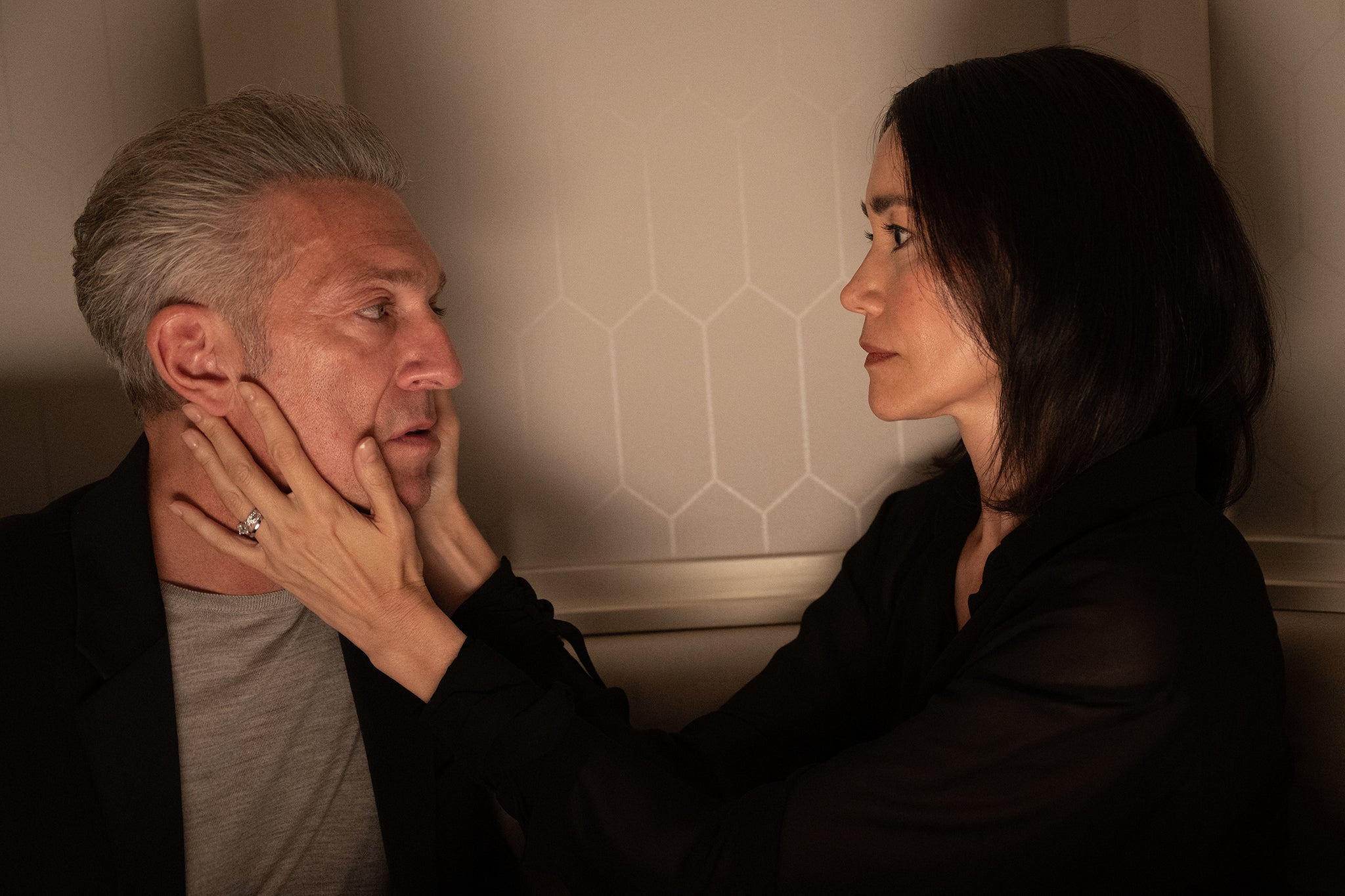“I read all the grief books and none of them matched exactly my grief,” director David Cronenberg told the LA Times in April; his wife of 38 years, Carolyn Zeifman, died in 2017. The Shrouds is about her absence. It’s not autobiographical, though its protagonist, Karsh (Vincent Cassel), dresses only in black and wears his hair in a white-grey swoop in a vague imitation of the Canadian auteur.
Karsh also feels as Cronenberg does. He explains that his grief is not literary, nor intellectual – but visceral, a tangible pull towards the dead. He feels an urge to climb into the coffin with his late wife, Becca (Diane Kruger). His is the belief that we love not only the soul of someone, but its precious home: the body.
Maybe that’s not how everyone feels about love and the loss of love, but it’s so beautifully, erotically, romantically, and compulsively depicted in The Shrouds that the idea sticks to the bones like the small nodules Karsh discovers on Becca’s skeleton post-mortem. What they are and how they came to be form one of the film’s great mysteries.
Karsh knows death better than most. His final tribute to Becca was the foundation of GraveTech, a futuristic cemetery in which the deceased are wrapped in metallic shrouds that capture a constant, three-dimensional CT scan image. This allows the mourner to witness their loved one’s gradual disintegration. “I can see what’s happening to her,” Karsh explains. “I’m in the grave with her.”
Here is the idea of the body as – above the mind – the true locus of the self, a well of revulsion, desire, poetry, humour, hunger, as expressed both by the lumpy, sticky creature of The Fly (1986) and the bickering psychoanalysts of A Dangerous Method (2011). This is Cronenberg’s core philosophy. Perhaps you could better describe it as a kind of faith.
The Shrouds lingers on images of Becca (a memory? a ghost? a dream?) – her left breast and forearm gone, replaced with puffy, winding scars. She fears that if she and Karsh have sex, her cancer-ridden bones might shatter. But, still, she needs to be touched and to be known. The sick body is represented as equally tragic and sexually desirable. It’s complex, but radical, too.
The film also raises questions about how rare a resource the body feels now that the rise in AI seeks to imagine a world where the mind can exist entirely without it – and what a lonely and frightening prospect that seems. When Karsh discovers that his GraveTech site has been vandalised, he attempts to track down the culprits to understand their motives, with the help of Becca’s lookalike, conspiracy theorist sister Terry (Kruger, again) and her meek, techie ex-husband Maury (Guy Pearce). It only leads Karsh to misery and paranoia, trapped inside his own spiralling thoughts about Russia and China-led surveillance, industrial saboteurs, and eco-terrorists.
The Shrouds could be classified as a thriller, but the breadcrumbs aren’t really the point. It’s about the hollowing effect of living under the thumb of so many of these incorporeal things, including the seductive but oddly taunting voice of Karsh’s AI assistant Hunny (Kruger, again), who happens to have the voice and appearance of his late wife. What does it mean that she keeps asking to appear to him as a fluffy, heavy-lidded koala bear?

Cronenberg’s films have, certainly, grown colder and more austere in their look over time (not that they were ever sunbaked to begin with), and the same is true here, represented by Douglas Koch’s metallic cinematography, and even in the way Cassel delivers his lines with a slight lean-back, as if he were perpetually in disbelief. It’s so much harder, now, to be truly close to one another. Body to body, flesh to flesh. The Shrouds finds strange comfort in the grave.
Dir: David Cronenberg. Starring: Vincent Cassel, Diane Kruger, Guy Pearce, Sandrine Holt. Cert 15, 120 minutes.
‘The Shrouds’ is in cinemas from 4 July







